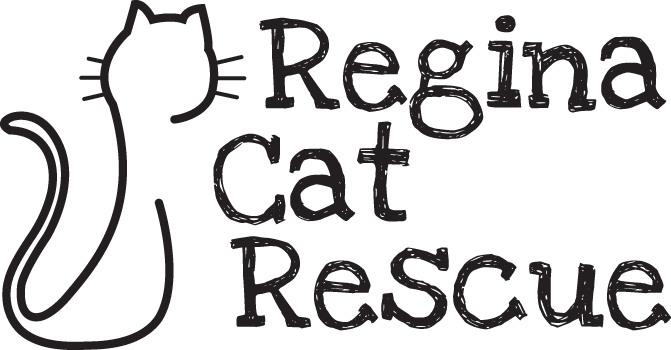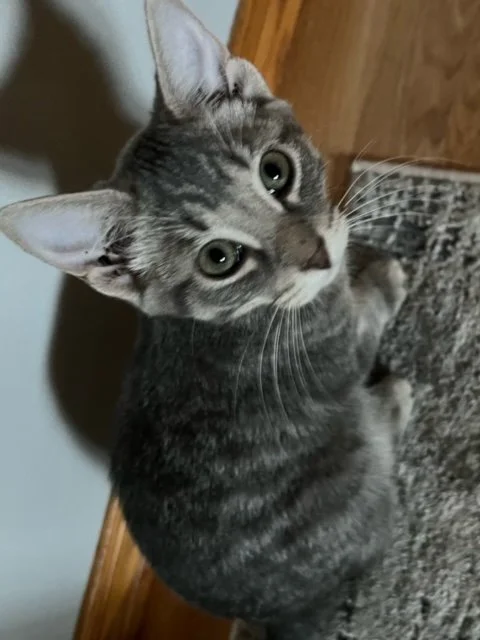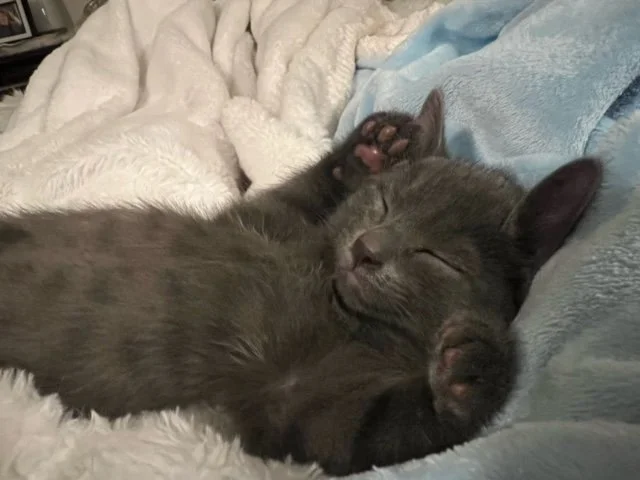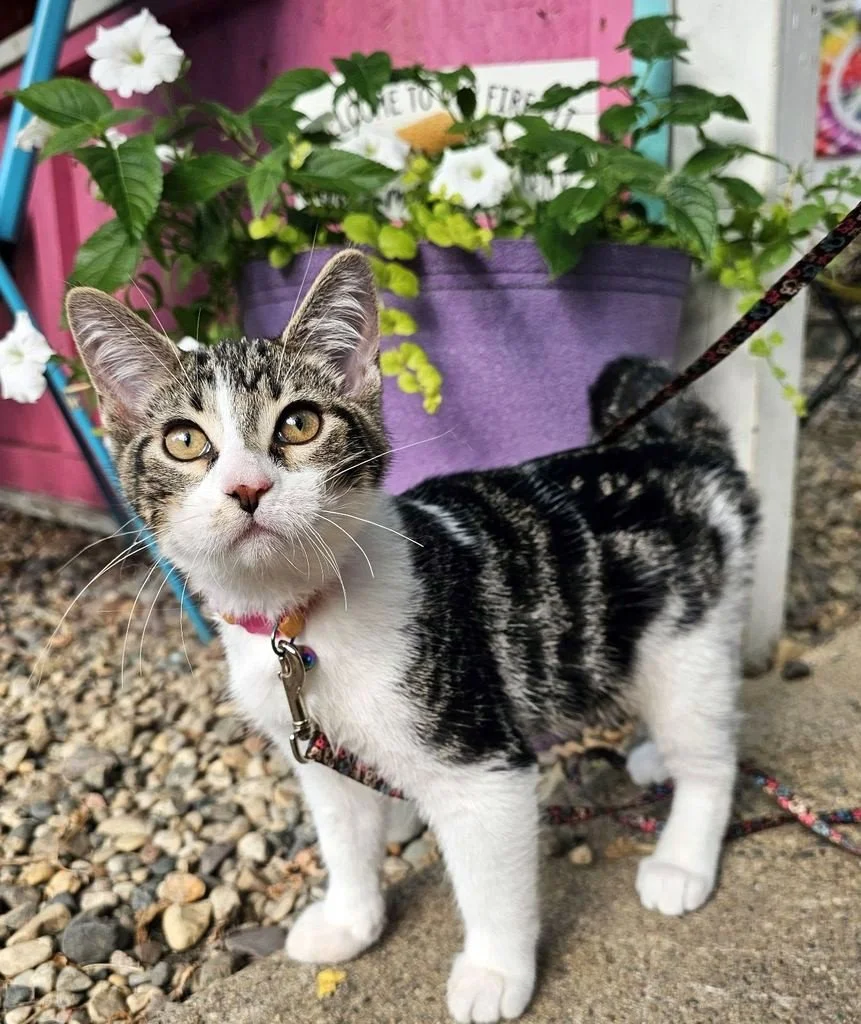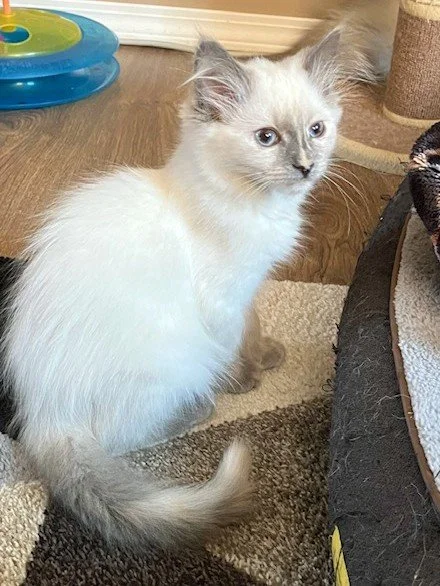Meet our volunteers: Jackie Kruger
/RCR relies heavily on kind-hearted foster families to provide love, care and shelter for rescue cats and kittens while they wait to be adopted into their forever homes.
Jackie holding Molly, a feral kitten, for the first time.
Jackie Kruger, who’s been a foster with RCR since 2009, knows a thing or two about fostering; she’s had more than 48 foster cats pass through her home. Jackie was generous enough to allow us to ask her about her beginnings with RCR, her experience as a foster mom, her advice to potential fosters and more.
1. What made you decide to become a foster for RCR?
It was after the loss of our first cat Whiskey. I wasn't ready to commit to having another cat and we had one in the house and she was lonely. I had read about fostering for People for Animals (RCR’s legal name) at work on our water cooler. Really that's how we got started fostering. Lolita was our first foster cat. She lived with us for eight months before she found her home.
2. Can you tell us a little bit about some of the feral kittens you fostered recently?
Asia is now 10 months old and was trapped by the feral team last year. She and her siblings were separated into pairs and went to foster homes. Asia came to us as a difficult case. She hadn't been socialized enough and was still pretty wild at 16 weeks old. With feral kittens, they like to capture them around the time they can leave their mom. The younger they are, the easier they are to socialize. When we get a pair of ferals we make up a wire cage with everything they need: food, water, a litter box and a place for them to hide. Feral kittens are pretty messy. They spill their water. They kick litter all over the place. Our job is to get them used to being in a house. The first couple of days, they’re in a quiet room and then we move their cage into the living room where they can observe us and be part of the household. This is about the same time they get curious about things and are not so hissy.
Jackie’s dog Bongo watching over his “babies” in the feral kitten cage
Feral kittens are like the Tasmanian Devil. If you try to pick them up too soon they are crazy, spinning to get away. We watch for signs that they are ready to be picked up, like eating food off the tip of a finger. They will meet you at the cage door. Right now it is about a week since we got Trixie and Molly. I picked them up for the first time last night.
3. Do you have pets of your own? How do they respond to the foster animals, and vice versa?
We have two dogs and three cats of our own. They really help with the socializing of the kittens. Lily is a foster fail. She was from our first litter of tame kittens. She’s the one who cares for the little ones by bathing them and snuggling with them. Asia is really attached to our Lily. She would do best in a house with another cat as a friend. The dogs add another area of teaching the foster cats to trust dogs. We also have two little girls who love to hold kittens so they get lots of people time, too.
4. It sounds like you’re busy! How do you fit fostering in with your schedule?
We just add the feeding schedules in with all our other pets. It's pretty simple actually if you stay on top of litter box duty. Everyone helps out with socializing and feeding the animals.
Asia relaxing in Jackie's home.
5. What has been the most rewarding part of fostering?
The most rewarding thing is when you find a good match for a cat that has been in your care. We’ve had three cats returned to us due to allergies and no fault of their own. We tell every adoptive family that if there’s any reason they can no longer care for their new pet, they can return them to us, no questions asked. This is something that we like about RCR as a rescue group: once a rescue, always a rescue. People always say they could never foster because they would keep them all. And at times, it is hard. We all get attached to one or all of them but we know that our job is to find them homes. We’re just a stopping place to get them ready.
6. What do you think is the most important part of a foster?
Our most important part of fostering is to educate others about what Regina Cat Rescue does, and the impact we have on the stray cats and feral colonies in Regina by taking them into our homes and giving them a chance at a better life.
7. What would you tell someone who’s thinking of fostering through RCR?
I’d tell them it's rewarding work. At the end of the day, you can make a difference in that one cat’s life. In the end, we let them go because it makes room for us to help the next one.
If you’re interested in applying to foster a cat or have more questions about fostering, email us at reginacatrescue@gmail.com.
- Interview by Madeline Bates
Editor's note - Since this interview Molly and Trixie have been adopted, and Jackie and her family have decided to official adopted Asia as their own.
